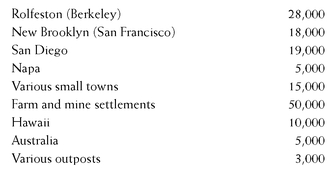Conquistador (89 page)
Authors: S. M. Stirling

By 2009, the population is 150,000, not counting 40,000 or so temporary Gastarbeiter on five-year contracts, who don't have children. The Commonwealth's TFR (total fertility rate) fluctuates between 3.7 and 4; about like the United States at the height of the baby boom in 1957, but stable, and it has been since the 1950s; the death rate is slightly below 8 per 1,000. Median age is around 26. There is a slight surplus of males among adults because of immigration effectsâthat happens anywhere with substantial immigration.
The shape of the population pyramid is more like that of Malaysia or other upper-income developing countries than that of the contemporary United Statesâor even that of the United States in the 1950s, since the baby boom there followed a period of very low fertility in the 1930s. The Commonwealth of New Virginia started out with a fairly high TFR and has maintained it unchanged, so the pyramid slopes out sharplyâeach age-cohort is about double the size of the one above.
With the continuing trickle of immigration, the annual population increase is about 3 percent.
Note that immigration tends to distort the population pyramid by increasing the percentage of the total in their prime reproductive yearsâthere is a bulge in the 20 to 40 age group. Thus natural increase is higher than would be expected with the TFR and mortality rates, despite the fact that immigrants tend to have a lower TFR than the native born.
Doubling time for the Settler population is (as of 2009) about 23 years. This is lower than it was in earlier periods because immigration has remained static or declined slightly and is therefore smaller relative to the total population.
Population distribution is about:

1
Tocharian is the name given to a group of Indo-European languages spoken in what is now Chinese Turkestan/Sinkiang from the Bronze Age through the early medieval period. The Tocharian speakers were the easternmost of the Indo-European peoples, and their tongue (rather oddly) shows a closer kinship to the western Indo-European languages (Celtic, Germanic, Greek, Italic) than it does to the Indo-Iranian group. Recent archaeological work in the Tarim, whose climate is uniquely suited to preserving bodies, has shown that the Tocharians were European in appearance as wellâtall, narrow-faced people with light complexions and often blond or red hair; in fact, they looked rather like Central or Northern Europeans. In our history they were overrun and assimilated by Turkic-speaking peoples, the ancestors of the present Uighur population of Sinkiang.
Other books
The Deeper He Hurts by Lynda Aicher
[When SEALs Come Home 04] - Heated by Anne Marsh
Bloodstream by Tess Gerritsen
SEAL My Home: Bad Boys of SEAL Team 3, Book 2 (SEAL Brotherhood Series 9) by Hamilton, Sharon
I'm Glad About You by Theresa Rebeck
Predator's Gold by Philip Reeve
Sleep by Nino Ricci
Falter Kingdom by Michael J. Seidlinger
